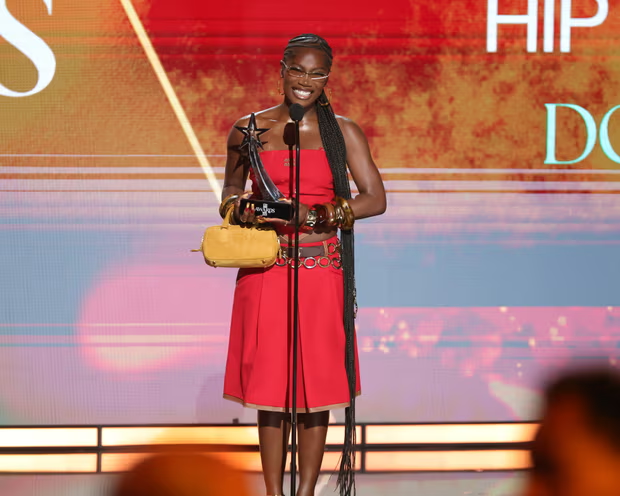Let’s rewind to the 25th BET Awards, an evening that transcended the usual spectacle of celebrity and song to become a potent battleground of culture and civil liberties. While sequins shimmered and high heels clicked on the red carpet, a different kind of tension crackled just beyond the Peacock Theatre’s gilded doors. Doechii, in a moment that will undoubtedly echo through award show history, seized her victory not for self-congratulation, but to hurl a political bombshell about the “ruthless attacks” unfolding in downtown LA.
The Unsettling Dichotomy: Glamour Meets Ground Troops
Imagine the scene: inside, Kevin Hart’s comedic stylings lightened the air, while outside, an ominous shadow loomed. A staggering 4,000 National Guardsmen and 700 Marines – deployed without California’s consent, fulfilling a controversial federal order from the Trump administration – patrolled the streets. This militarized presence was a direct response to the protests ignited by widespread ICE raids in Latino neighborhoods, a move that sent shockwaves of outrage from city leadership to Governor Newsom himself. The contrast was not merely stark; it was a jarring juxtaposition of celebration and suppression, a visual and emotional paradox that set the stage for Doechii’s audacious act.
Doechii’s Mic Drop: A Speech That Demands Replay
When Doechii clutched that BET Award, she didn’t just accept it; she amplified a desperate cry from the streets. Her acceptance speech was not a thank you; it was a manifesto. She didn’t mince words, denouncing the events outside as “ruthless attacks creating fear and chaos in our communities in the name of law and order.” She challenged the very fabric of American democracy, posing the searing question: “What kind of government is it when every time we exercise our democratic right to protest, the military is deployed against us?”
But Doechii’s call for solidarity extended beyond the immediate crisis. She meticulously wove together a tapestry of shared struggles, urging unity among Black, Latino, and trans communities, and even extending empathy to the victims in Gaza. In a single, powerful breath, she ripped the narrative away from music accolades and firmly anchored it in the realm of civil rights. The roar of the crowd that followed wasn’t just applause; it was an acknowledgment of a profound truth articulated on a national stage.
Beyond the Red Carpet: When Celebrities Become Catalysts
Doechii’s powerful statement wasn’t an isolated incident. The collective dismay at the militarized response reverberated through the entertainment world, with artists like Billie Joe Armstrong and Finneas echoing similar sentiments. This burgeoning trend – the transformation of entertainment platforms into rostrums for protest – is a seismic shift in celebrity engagement. It forces a fundamental question upon both the public and the industry: are red carpets still neutral territory, or have they evolved into essential national stages for accountability, where silence is tantamount to complicity?
The Constitutional Gauntlet: State vs. Federal Power
Beneath the celebrity and the protests, a significant political and constitutional showdown was brewing. Trump’s assertion that his deployment would “restore order” was met with a swift and furious challenge from Governor Newsom, who decried it as illegal and launched a lawsuit, framing the federal action as a blatant power grab over state rights. LA Mayor Bass further underscored the gravity of the situation, declaring it a “test case” for federal authority. This wasn’t merely a fleeting moment of celebrity defiance; it was a high-stakes constitutional clash with far-reaching implications for the balance of power in the United States.
The Echo Chamber of 2025: A Resonating Moment
The impact of that night extended far beyond the Peacock Theatre. Protests, fueled by similar grievances and inspired by Doechii’s audacity, spread like wildfire across the nation – San Francisco, Philadelphia, and even Boston locals rallying in solidarity. This widespread activism amplifies a crucial question: do entertainers bear a moral obligation to speak out when it truly counts? And in an increasingly interconnected world, where brands and fans are constantly scrutinizing, how will such outspokenness shape career trajectories – will it be a risk or a reward?
The Final Cut: A Night That Mattered
The 25th BET Awards were undeniably more than a glittering display of musical talent. They were a vivid tableau where the worlds of entertainment and government collided, and where defiance found its most potent voice. Doechii, with a single, audacious acceptance speech, transformed a moment of personal triumph into a powerful statement about democracy and civil liberties. On that unforgettable night, she reminded us all that sometimes, the most resounding applause isn’t for a song, but for a political truth boldly spoken.
Over to You: Keep the Conversation Going
The curtain has fallen on the awards, but the conversation has just begun.
- Did Doechii overstep her boundaries, or did she hit the bullseye of public consciousness?
- In an era of escalating social and political tension, do celebrities have a moral imperative to speak up, or should they remain in their lane?
- What are the anticipated ramifications for Los Angeles, for Governor Newsom’s pivotal lawsuit, and for the fundamental right to protest in America?
Drop your thoughts below – this narrative is far from over.


